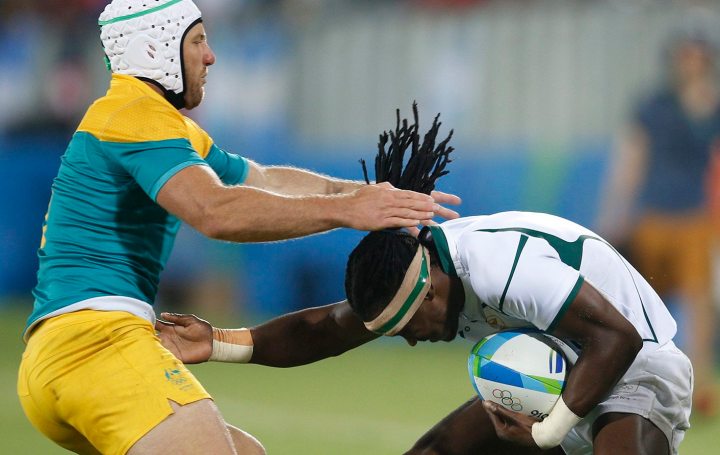Newsdeck
Rio 2016: South Africa razzle dazzle to set up Sevens semi against Great Britain

South Africa bounced back from being beaten by Australia in the pool stages, winning 22-5 in the quarterfinals on an emotionally charged day filled with upsets.
South Africa’s Sevens side are one win away from a guaranteed gold or silver medal after reaching the Olympic semi-finals at a wet
Awaiting them for a place in the final on Thursday (kick-off 3pm local, 8pm SA time) is Great Britain, who needed an extra-time try to break the 0-0 deadlock against Argentina to progress. The other semi sees Fiji take on Japan. The losers of both semis will meet in the bronze medal match.
For South Africa it was a tale of two halves on the second day of Sevens competition, the first time rugby has featured in an Olympics since 1924. Earlier, they rounded off their Pool B match and put in an error-strewn and scrappy display to lose 12-5 to Australia, but still managed to top their pool.
By a strange twist of the permutations, they were allotted a quarter-final against the same Australian opponents some seven hours later. This time coach Neil Powell’s men responded in the way champions do, winning 22-5. While Japan had stunned New Zealand and then beat France to qualify for the semi-finals, the smart money has to be on Fiji beating them and then the final to be between the two pre-tournament favourites, Fiji and South Africa. They have been the two best teams in the competition by a considerable margin.
Powell had called the early defeat to Australia ‘a wake-up call, but no reason to panic. We’ll regroup and the quarter-final is now do-or-die’. What the coach did was make a few changes and he started with his strongest-looking seven for the knockout match with Australia: Philip Snyman, Kwagga Smith, Kyle Brown, Rosko Specman, Cecil Afrika, Seabelo Senatla and Juan de Jongh took to the field, with Dylan Sage, Tim Agaba, Werner Kok, Cheslin Kolbe and Justin Geduld on the bench.
Understandably, there was a lot more urgency to both teams in the quarter-final and South Africa used an effective rush defence to close down Australia early on. A quicker tempo suits the South African game. So it proved when Brown broke and switched inside to feed Specman who goose-stepped clear close to the line and over with nearly three minutes gone but Afrika missed the conversion.
South Africa
Almost immediately Australia struck back. Tom Cusack rounded off good work that he’d started on the halfway line as he and Allan Fa’Alava’au barged their way up the
Australia started the second half brightly but South Africa defended well and a big tackle by Smith when their opponents looked like they might go over in the corner, led to a
Australia
De Jongh almost went over in the left corner but a couple of toes touched the sideline as he attempted to go over in the tackle, and he also knocked the ball on in the attempt. The scrum was a good one for the attacking side and the front row pressure saw Australia kick it out. South Africa
More pressure was applied and in the ensuing scramble for the line
Earlier, Powell had said that his team pride themselves on their defence yet, against Australia, the tournament’s second favourites were lethargic. They were wearing their alternate white jerseys and much like the Springboks were when wearing white against Ireland, the Sevens team were off their game. In fact, it’s not exaggerating to say that in a forgettable first half they rarely got their hands on the ball and didn’t get the faintest sniffs of the
Australian red zone, let alone look like scoring.
Although South Africa, who were doing the bulk of the defending, were typically robust in the tackle areas, they were disjointed and looked as rusty as they were expected to be against Spain in their first match of the competition. Australia carved through the defence twice and it was 12-0 at the whistle.
The second half brought more of the same: more errors and stop-start moves and Australia were comfortable to hold their line and snuff out any danger. Finally, South Africa put together their first – and only – series of phases and they spread play across the park a couple of time before a good
Still, with 2:20 remaining, South Africa were back in it. However, their indecision was spotlighted when they were awarded a penalty in their own half and with time running out. Fully 20 precious seconds elapsed as they debated kicking for a long touch or running the ball. They eventually took the tap but it amounted to nothing.
Perhaps fittingly, it was another penalty against South Africa after the hooter which allowed Australia to boot the ball into the stands to celebrate the win.
However, South Africa
Earlier, in the quarterfinals top seeds Fiji edged a faltering New Zealand to set up a rugby sevens semi-final against unheralded Japan in their bid for a
In a dramatic day’s rugby at the Deodoro Stadium, the
Japan, pulled off one of rugby sevens’ biggest shocks when they beat New Zealand 14-12 in their opening pool match. And they continued their fine run of form by nipping France 12-7 in their quarter thanks to a last-gasp try from livewire Teruya Goto following
South Africa will play their semi-final match at 20:00 on Thursday. DM
Photo: South Africa’s Seabelo Senatla (R) in action against James Stannard of Australia during the men’s Rugby Sevens
First published on sascoc.co.za, additional reporting by AFP.


















 Become an Insider
Become an Insider